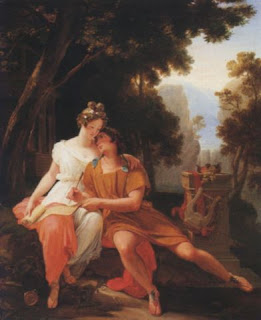I have an article that's almost ready to go (they always are, aren't they?), except for some Greek texts that need to be formatted in some particularly picky and annoying ways. I was reading one over just now, expecting to continue to be bored and annoyed, but instead the sound of the Greek gave me my first bit of Classics-related joy in several days.
I thought, "I've missed you, Greek."
I have thought before that the sense of professional disconnection I sometimes experience relates to spending 90% of my time teaching a language I have little intellectual interest in, namely Latin. That seems harsh, and I tend to speak hyperbolically about these things. I'm happy that Latin has paid my bills for the last half-decade. When I hear something interesting about Latin I think, "oh, that's nice," whereas I love the sound of Greek, its mysterious and fluid sound-changes, and its literature whose original and profoundly situational performance contexts we can often only guess at.
I guess I have Steve Jobs to thank, as corny as that is. I used to spend the entire early morning preparing for my Latin class, and then I read something he said, about if this was the last day of your life, would you want to spend it the way you were planning to do?
And I thought, I'm done neglecting my first and best-loved foreign language in favor of what (right now) pays the bills.
Pin It


